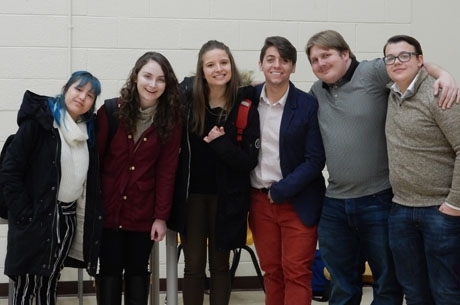
“Being a student means learning from every situation—and from the people around you,” said Amber Hatcher ’18C about a recent trip St. John’s University’s Debate Society (SJUDS) took to five tribal colleges in Montana, where they helped students strengthen their skills at public speaking, deliberation, and advocacy.
Along with Amber, Yves Nguyen ’19CPS, Taylor Tate ’17C, and Mikayla Doherty ’18C were chosen to participate in the inaugural program, in which the SJUDS partnered with Rocky Mountain College in Billings, MT. Accompanying the students were Stephen Llano, Ph.D., Associate Professor and Director of the Debate Society, and graduate assistant Emilio Horner ’18G.
“This outreach effort was a unique opportunity for the Debate Society to further St. John’s mission by serving those in need,” Dr. Llano observed. “We look forward to an annual outreach program, in cooperation with our Montana partners at Rocky Mountain College and the tribal institutions, to spread debate as a powerful tool for producing knowledge about the world.” The program, he noted, is scheduled to resume next spring and will involve more tribal colleges.
The students visited tribal institutions throughout Montana: Little Big Horn College, on the Crow Reservation; Chief Dull Knife College, Northern Cheyenne Indian Reservation; Fort Peck Community College, Fort Peck Assiniboine and Sioux Reservation; and Stone Child College, Rocky Boy’s Indian Reservation.
At each site, Debate Society members worked alongside their hosts, providing instruction, staging mock competitions, and leading discussions on important contemporary issues. “Having an open dialogue and relationship allows us, as New York-based students, to learn about experiences different from our own, while allowing reservation residents to continue educational discussions among themselves,” said Yves.
Students also debated the pros and cons of the Dakota Access Pipeline, which has drawn international attention due to protests led by Native peoples from the Standing Rock Indian Reservation in North and South Dakota. “At the tribal colleges, students have the same hunger for knowledge that we do, and discussing our perspectives on issues like the pipeline resulted in meaningful conversation from a variety of viewpoints,” Amber noted.
The SJU students not only taught debating, they discussed tribal and reservation issues with peers at the tribal colleges. They also participated in a class on modern tribal law. “Many members of the Native communities opened up to our team about impactful moments in their lives,” Amber said. “It was great to see how coming together to promote discourse led to very meaningful conversations.”
